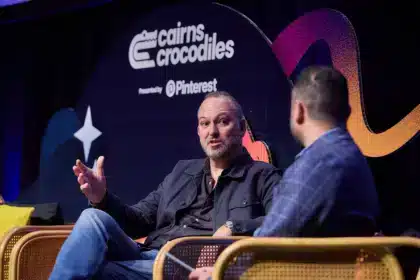As the 2025 federal election looms, a new wave of political messaging is emerging – not from campaign ads or party platforms, but from Chinese influencers on Rednote.
Known for food, fashion and real estate content, these creators are now stepping into an unlikely but powerful role: connecting candidates with voters mainstream politics can’t reach.
On a platform where political content is restricted and federal MPs like Labor’s Jerome Laxale report they’ve experienced “shadow bans,” some lifestyle influencers are stepping in to fill the void. These content creators – who usually post about food, real estate, shopping or parenting – are now featuring interviews with candidates in key seats like Bennelong and Bradfield, giving politicians a rare line of communication to an under-engaged but vital audience.
Liberal candidate for Bennelong, Scott Yung, has appeared in multiple influencer interviews on Rednote in recent weeks. Introduced by creators like Sydney Mama Lankey, who typically showcases luxury real estate to their 11,000 followers, Yung was described as “this legendary young Chinese-Australian”.
Other videos feature Yung sharing stories about his connection to former Prime Minister John Howard, complete with vintage photos and nostalgic commentary. The videos have been enthusiastically received by followers, with comments like “big praise for him” and “wow, the Liberal candidate is so outgoing.”
The influencer behind Sydney Mama Lankey says she wasn’t paid to feature candidates like Yung or independent Bradfield hopeful Andy Yin. She simply wanted to introduce them to her community as fellow Chinese-Australians.
These influencer-led interactions sidestep the platforms political advertising regulations – without necessarily breaching them – and offer a peer-to-peer tone that feels more authentic than a press conference or campaign ad.
The Rise Of The KOL
According to Santosh Murthy, managing director at IDENTITY Communications, this kind of cultural bridge-building is exactly why key opinion leaders (KOLs) are so effective in these spaces.
“A key opinion leader (KOL) in multicultural communities, like any influencer, provides a voice and can advocate for brands and/or topics,” said Murthy.
“This is particularly relevant for platforms like Xiaohongshu (Rednote / Little Red Book) which thrives on user-generated content and referrals. An endorsement from a popular KOL on any brand or topic provides a strong signal and possibly spurs further advocacy within the community”.
While Rednote is largely built around beauty, fashion and lifestyle content, Murthy explained that Chinese social media platforms more broadly – including WeChat – have long been powerful tools for political and cultural discourse, often away from the eyes of regulators.
“WeChat, for example, takes it one step further towards personalised conversations with environments like private user groups often being treated as the ultimate trusted closed community,” he said.
That trust, combined with sheer scale, makes Chinese-language social platforms an opportunity politicians and marketers can’t afford to overlook.
“Wide reaching, mass communication is also possible and recommended on Chinese social, with monthly active users significant and growing. However, knowledge of the nuances of the format, the power of KOLs and a deep understanding of what content/approach works best (and when/how to employ specific tactics) is absolutely vital”.
Reaching Audiences Where They Are
While mainstream campaigns often struggle to reach multicultural communities, some candidates are rewriting the rules — not through big-budget advertising, but by leaning into cultural nuance and platform-native storytelling.
POLARIS+ CEO Jessica Yue told B&T that candidates like Scott Yung are succeeding because they’re doing what all smart communicators do: starting with the audience.
“Like any campaign — political or otherwise — success starts with understanding your audience. Who they are, how they consume content, and what kind of storytelling resonates with them. These fundamentals are universal across cultures, but often overlooked when it comes to multicultural communities,” Yue said.
In the case of Liberal candidate for Bennelong Scott Yung, Yue said he recognised the influence and size of the Chinese-Australian voter base and chose to “engage them where they actually are — on platforms like REDnote”.
“By using native video storytelling and partnering with trusted local creators, he was able to share his message in a format that felt natural, relevant, and community-led. It wasn’t just a smart social tactic — it was cultural fluency in action”.
This cultural fluency taps into shared values and engages audiences beyond a one-size-fits-all approach. While influencers sharing lifestyle content might not seem like the right place for political candidates to share their messaging, it is precisely this unexpected element that allows the message to travel further, Yue explained.
“These are best practices we champion at POLARIS+: giving power back to the community to connect with the community. And it applies to platforms beyond REDnote — WeChat, for example, still plays a vital role in Chinese-Australians’ everyday lives.
“The so-called ‘shadow ban’ of political content isn’t unique to Chinese platforms — it’s present in mainstream media too. That’s why content seeding and native storytelling matter. When political messaging is wrapped in culturally relevant narratives and trusted voices, it not only avoids censorship, but builds genuine engagement.
Yue noted that we’re seeing more political conversations happening organically on REDnote among local users. Some Australian politicians even have their own accounts there. For many Chinese-Australians, it’s simply a safer, more relatable space — a platform where they feel seen, not judged or misunderstood. Mainstream media often misrepresents or sidelines this community, creating a disconnect. And when people don’t feel heard, they naturally disengage.
“At the end of the day, Chinese audiences are just people — with their own languages, cultural nuances, and preferences — but the same desire to connect, to be understood, and to make informed choices. The same marketing principles apply: relevance, trust, and authenticity always win”.
Not Without Challenges: Misinformation in the Mix
While KOLs are offering a powerful, authentic bridge between politics and community, their rise is happening in parallel with a more troubling trend on the same platforms: misinformation and AI-generated disinformation.
Researchers from the RECapture project, led by several Victorian universities, have identified a wave of misleading posts and deepfakes circulating on Rednote. Among the most notable: a manipulated video of Opposition Leader Peter Dutton, falsely depicting him speaking Mandarin and vowing to deport Chinese Australians. Other posts have distorted his positions on housing, healthcare, and international students, or falsely claimed police are arresting temporary migrants.
Although official accounts of political candidates – from Labor, Liberal, and independents – have reported being “shadow banned” on Rednote, unverified and sensationalist content continues to spread unchecked.
The Australian Electoral Commission has acknowledged these challenges but says its capacity to monitor emerging platforms like Rednote is limited.
“If we receive information about unauthorised content on the channel, we will have a look at it and if it requires action, we will take it,” an AEC spokesperson said. “This is the standard approach we take across all social media platforms”.
Murthy noted that these platforms often operate under strict but inconsistent regulation, and warns that a lack of awareness in the broader market is compounding the issue.
“Chinese social media, and other digital platforms in the multicultural space, are often quite heavily regulated with their own terms and conditions that are quite strict and restrictive,” he said. “However, they do differ from platform to platform, and it’s fair to say that there is a general relative knowledge gap in the market, and therefore they’re perhaps not as well monitored as they could be”.
Multicultural Media: “A Bulwark Against Misinformation”
As this digital threat grows, so too does the importance of independent multicultural media in safeguarding democratic discourse.
“Independent multicultural media is a bulwark against misinformation and disinformation,” said Fotis Kapetopoulos, secretary of Independent Multicultural Media Australia (IMMA), speaking to B&T last month.
Platforms like Rednote, he said, may be powerful communication tools – but their lack of oversight, combined with the rise of AI-generated falsehoods, makes them risky terrain for voters seeking truth. In contrast, longstanding ethnic mastheads like the Chinese Herald, Neos Kosmos, and Jewish News continue to provide fact-checked, regulated journalism that communities can trust.
“Regardless of our political values or political leans… we abide by the liberal democratic principles of media, which is to tell the facts, to not lie,” said Kapetopoulos.
This distinction matters more than ever. Kapetopoulos adds, “As a Chinese Australian, you’d be guaranteed that when you read the Chinese Herald, whatever you’re going to get there is not going to be a lie.”
These outlets, regulated under Australian Communications and Media Authority (ACMA) standards, are run by Australian citizens and serve multilingual communities with verified information – in stark contrast to anonymous or unverifiable content circulating on social apps.
“Just like The Age or The Guardian, we are valid mastheads. We are not some character on social media presenting themselves as valid,” Kapetopoulos said.
As the election heats up, the role of Chinese-language influencers – and the communities they speak to – is becoming impossible to ignore. Whether by design or by necessity, KOLs are now part of the political conversation and the intersection of trusted influencers, independent ethnic media, and unregulated social platforms is shaping how multicultural communities receive – or reject – political messaging.
Joint reporting by Aimee Edwards & Fredrika Stigell








